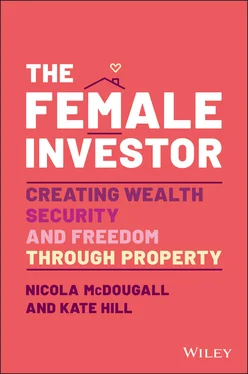But let's get down to business.
Property prices generally only go one way over the decades — and that is up. It can seem impossible to ever save fast enough to keep pace with rising prices, which is one reason why so many women give up at the first hurdle.
But there are ways and means to help you save that first deposit, including the fact that it doesn't have to be the mythical 20 per cent of the purchase price that many people think it does — although that is always advisable. You do need to show genuine savings to lenders.
Saving funds for a deposit is a great exercise in budgeting and money management that will hold you in good stead for the rest of your days.
5 SIMPLE STEPS TO SAVE A DEPOSIT
Here are some simple steps you can take to help you reach and clear that first savings hurdle.
1. CUT BACK — BUT DON'T FORGET TO LIVE
Most of us have higher discretionary spending than we realise — especially with the ease of online ordering of everything from clothes to food to wine. Saving a deposit takes discipline, delayed gratification and plenty of patience, which means you may need to cut back on some of the things you like to enjoy the most for a while.
Perhaps, instead of meeting up with friends for drinks and dinner at a restaurant, you take turns to host at each other homes instead? Maybe save ordering from a food delivery service for a Friday‐night treat, so that you can celebrate the end of the week as well as the extra money in your bank account?
Working with a finance professional may be an idea to calculate how much of your income can be diverted to savings. You might be surprised with the result.
2. FROM LITTLE THINGS, BIG THINGS GROW
Set aside a certain amount from your salary or wages every time you are paid — and we mean on the day that it hits your bank account! Ideally, you should automate this so that you don't even notice it leaving your account and you don't have the chance to spend it.
You may need some expert advice, including on creating a budget, to help you determine what is a realistic amount that you can save. The last thing you want to do is try to save too much and leave yourself short when bills arrive, or it all gets too hard and you simply give up.
3. OUT OF SIGHT, OUT OF MIND
Online banking means it's easier than ever before to park those savings in a separate bank account. Now, they won't really be out of sight and out of mind, but they won't be in your everyday transaction account either, beckoning you enticingly.
Ideally, they could be in an account where those savings can work harder for you, too — perhaps in an offset account, if you already have a mortgage, to lower your interest rate repayments, or simply in an interest‐earning one that can add some extra dollars to the balance without you doing anything else.
Another way to help supercharge your savings is to simply earn more money, perhaps from a part‐time gig for a period of time.
Maybe instead of ordering from a food delivery service, you work for them from time to time instead? There's a huge number of options out there these days.
Another strategy to help you save more money could be creating personal challenges, such as not eating out for two weeks, or signing up for Dry July or similar, which will likely end up being good for your liver as well as your purse!
5. GETTING TO GRIPS WITH GRANTS
There are usually a variety of different first home owner grants on the table, which can help to shave thousands off purchasing costs (such as by reduced stamp duty fees in Australia), as well as funds that you can potentially use towards a deposit. Of course, there is no such thing as free money, so these sorts of grants often come with a number of criteria that must be met.
In Australia, these types of grants are usually administered by your state government, so it's best to do your research on its official website when reading up on what is currently available — they do tend to change quite regularly.
Mortgage or property loan pre‐approvals have become more and more popular over the years — and for very good reason. Back in the ‘old days' many buyers usually didn't even bother talking to a mortgage broker or their bank until they had put an offer on a property and were frantically trying to get their finances in order to finalise the deal. Sounds stressful, right? It was!
In hot market conditions and when buying at auction, a loan pre‐approval is non‐negotiable to ensure that you are ‘purchase ready' and can make an offer or a bid with confidence, knowing that you have the funds to back up your bravado.
However, we also recommend loan pre‐approvals for first‐time buyers and anyone re‐entering the property market. This will not only help reduce stress when buying, but also set the budget for your potential property purchase. Plus, it can make the difference between being the successful buyer or not when there is far more demand than supply in a market.
Don't go too crazy on the pre‐approval front. Applying for multiple pre‐approvals and multiple times can negatively impact your credit score. Keep in mind also that sometimes the banks won't issue pre‐approvals like they used to because they may be short‐staffed — like during the COVID‐19 pandemic — or their policies are changing every other day. This can be challenging, so always talk to your trusted mortgage broker about the best strategy for you before marching into the nearest bank.
The number of people using mortgage brokers has skyrocketed over the past couple of decades — for very good reason, if you ask us.
Most professional mortgage brokers have access to a large number of lenders who may fit your individual financial requirements.
They can also be on your team throughout your property investment journey.
Now we're not saying there is anything wrong with big banks, because your mortgage broker may find that one of the major lenders is right for you.
What we're saying is that going direct to a bank will probably not provide you with all of the options available to you. A mortgage broker, on the other hand, will have knowledge about, and access to, lenders who are the perfect fit for someone who might be self‐employed, a single parent, or who has a smallish deposit.
When it comes to successful property investment, experience counts. Work with a finance expert who has runs on the board, and who preferably also knows about property investment — we're thinking, for example, a QPIA.
There is a saying in the industry that property investment is as much a game about finance as it is about real estate, because without the funds to buy, well, you can't do anything at all, can you?
Anyone who has been investing for as long as we both have can tell a story about the time a bank was going to lend them $1.7 million when they only asked for $700 000, or the time that they wouldn't give them anything at all, even though their numbers were fine (thanks, COVID‐19 pandemic). The reality of the situation is that the lending environment can, and does, turn on a dime because of a bunch of factors too lengthy to list here.
One month you may qualify for a loan and the next you may not, because of levers being pulled at the top of the food chain to speed up, or slow down, lending. This can depend on what's happening in the economy, or whether local property markets are deemed too hot to handle (like Sydney back in 2017).
Читать дальше












